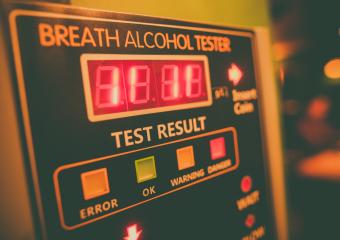Challenging a breath test
To secure a conviction for drink driving, the police must show evidence that you were over the drink driving limit when you drove. To do this they require you to provide specimens of breath into an evidential breath machine (EBM) and then use the results of that test against you in court.
A lot of people think that the EBMs are infallible and never produce an erroneous result, e.g. in an article titled, “Current defence strategies in some contested drink-drive prosecutions: Is it now time for some additional statutory assumptions?”, which appeared in the Forensic Science International journal in December 2018, Paul M. Williams wrote that, “There is no recorded case of such an instrument having given an inaccurate reading.” That is demonstrably wrong – you only have to look at the police’s procedure to realise that it is relatively so common there is a standard response written into the guidance for officers to follow when the EBM goes wrong. We have represented many clients in cases where the EBM has malfunctioned and produced inaccurate readings. Normally, the EBM itself highlights the error and tells the operator about it – error detection is literally built into the machine.
There are two legal presumptions that assist the prosecutor – a presumption is something that is assumed to be correct by a court, they can either be irrebuttable which means they cannot be challenged, or rebuttable presumptions which means they can be challenged. The two presumptions at work in every drink driving case are that: a) the EBM functioned correctly and was reliable; and b) that the defendant’s breath-alcohol level at the time he drove was not less than it was when tested by the police.
Both presumptions are rebuttable so can be challenged by the defence. The second presumption is often challenged by people who have been arrested at home after consuming alcohol – in fact we’ve even had a client who was arrested at the bar of a pub where police saw him consuming two pints of beer in the 30 minutes it took them to arrest him.
The first presumption is much harder to challenge, but a recent court decision may have made things a little easier for defendants. Up until October 2020, the leading case on challenging EBMs was Cracknell v Willis, a case from 1988 in which the High Court told us that when the presumption that the EBM operated correctly is challenged the magistrates must be satisfied that the EBM did in fact provide a reliable reading. In Willis, the court cited an example of a teetotaller motorist receiving an incorrect result from an EBM and being allowed to call the two bishops with whom he had been dining to give evidence that he did not consume alcohol.
The new case is Ali v Director of Public Prosecutions and it clarifies an important point about who must prove the EBM did or did not operate reliably.
In Ali, the District Judge hearing the trial required the defence to prove on the balance of probabilities that the EBM had not functioned reliably. When they were unable to do so, she convicted Mr Ali who appealed on the basis that the judge should have required the prosecutor to prove the EBM was reliable beyond reasonable doubt. The High Court agreed with Mr Ali saying:
“A defendant may adduce ‘relevant’ evidence that the EBM reading was not reliable. Once a defendant does that, it is necessary for the prosecution then to prove, [beyond reasonable doubt], that the reading was reliable, notwithstanding the evidence adduced by the defendant.”
This means that in future case, the prosecution will have to ensure they produce evidence that shows the results produced by EBM are reliable in any case where a defendant challenges the result.
If you have been charged with drink driving or any other motoring offence and require expert legal assistance, then call us on 020 8242 4440 or send us an email via our contact page.

